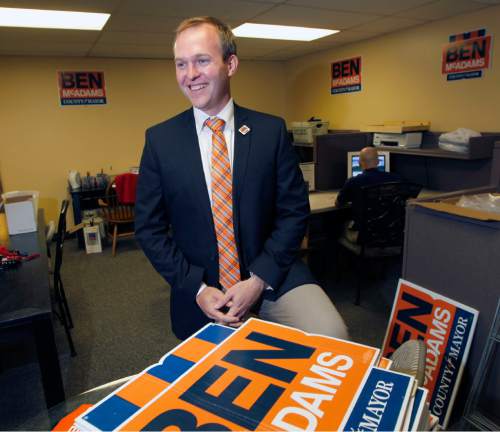This is an archived article that was published on sltrib.com in 2015, and information in the article may be outdated. It is provided only for personal research purposes and may not be reprinted.
Plans to develop a convention-center headquarters hotel in downtown Salt Lake City are back at square one.
Salt Lake County Mayor Ben McAdams said Tuesday that contract talks for Omni Hotels and Resorts to build a megahotel adjacent to the Salt Palace Convention Center — augmented with tax incentives from the state, county and Salt Lake City — have collapsed.
"The company's proposed financial terms during the last month of talks became too costly to Utah taxpayers," McAdams said in a news release. "I'm disappointed that we could not get to 'yes' with Omni, but it reached a point where they were asking for too much in public financing which would benefit their bottom line, at taxpayer expense."
Charlie Muller, Omni's vice president of acquisitions and development, also expressed regret that the county terminated negotiations.
He called the governments' proposed $75 million incentive package for a 750- to 800-room hotel (down from earlier talk of 1,000 rooms) "very compelling." But, ultimately, "while both sides were very close, the final economic terms were just not suitable enough for Omni to be able to commit to the project."
The decision received more favorable reviews elsewhere.
County Council Chairman Richard Snelgrove, who was on the losing end of a 6-3 vote when the council opted in 2012 to pursue a public-private partnership, applauded McAdams' decision to walk away from the talks.
"I've felt all along that a tax-subsidized hotel was wrong," Snelgrove said. "It should be left to developers and the private sector. We'd be helping a new hotel compete against existing hotels. That's not fair."
That's the position of Utah Taxpayers Association Vice President Billy Hesterman.
"Utah taxpayers should not be footing the bill for a plan that favors one business over another," he said, noting existing hotels already pay millions in taxes yearly. "We look forward to when Utah's convention and travel market can demand such a facility without taxpayer assistance."
Dallas-based Omni, which runs more than 60 hotels in North America, was the lone bidder on a request for proposal (RFP) issued by the county after the 2014 Legislature authorized the three governments to jointly offer the subsidies.
Officials believe a headquarters hotel would attract more large conventions to the city and appease the desires of the Outdoor Retailer trade show, currently the biggest group to meet here, for a functional headquarters site.
The legislation provided for a hotel developer to pick a site. It would receive post-performance tax breaks of up to $75 million to help underwrite construction of "public spaces" — meetings rooms, parking, utility lines — at the otherwise privately financed hotel. Projections estimated its cost at $335 million.
After Omni submitted the only bid for the project last November, a 13-member search committee recommended the county proceed with the negotiations.
McAdams said Tuesday that, by mid-July, "Omni wanted that incentive and then some, in the form of public grants and cash advances." He also said Omni would not agree to room-rate guarantees for large blocks of rooms required for conventions that would fill many hotels around the city, like the twice-annual Outdoor Retailer shows do.
Without room-rate protection, McAdams said, the deal was not acceptable to the county.
"I strongly believe in this private hotel development and its economic value to the state, but not at any cost," he added. "Salt Lake County is a great place to invest, with a strong, vibrant economy. We just need to find a hotel developer that understands what an opportunity this is, and wants to negotiate a fair deal."
Muller said Omni "understands and supports the need for a reasonable room block agreement," evidenced by its ability to reach deals "to the satisfaction of other municipalities for similar projects."
He also said the company "indicated to the county it would revisit its stance on room rate" if the county had agreed to other incentives.
But McAdams said no. The requested cost of public participation was too high. He said the county will reissue a request for proposals.
Planning in the canyons
The next act in Mayor Ben McAdams' plan to resolve local-government boundary disputes in Salt Lake County shifts Wednesday to planning for the canyons from the Utah County line north to Lambs Canyon.
First, the Salt Lake County Planning Commission at 8:30 a.m. and then the Millcreek Township Planning Commission at 4 p.m. will consider endorsing an ordinance that would relinquish their control over canyon issues to a new Mountainous Planning District and a nine-member Planning Commission representing interests from throughout the county.
Both meetings will take place in the North Building of the County Government Center, 2001 S. State.
Through the Community Preservation Act, McAdams has promoted the concept that governance of the canyons impacts everyone in Salt Lake County and shouldn't be guided only by their respective foothills' jurisdictions.
In the proposed ordinance, the mayor and County Council will appoint Planning Commission members, including one canyon resident, and strive to "provide as much geographically balanced representation as is practicable."
The main act of the Community Preservation process occurs Nov. 3, when voters in six unincorporated-area townships decide whether their communities should become metro townships or cities. Residents of four dozen unincorporated islands will have a choice of staying the way they are now or annexing into an adjacent city.



